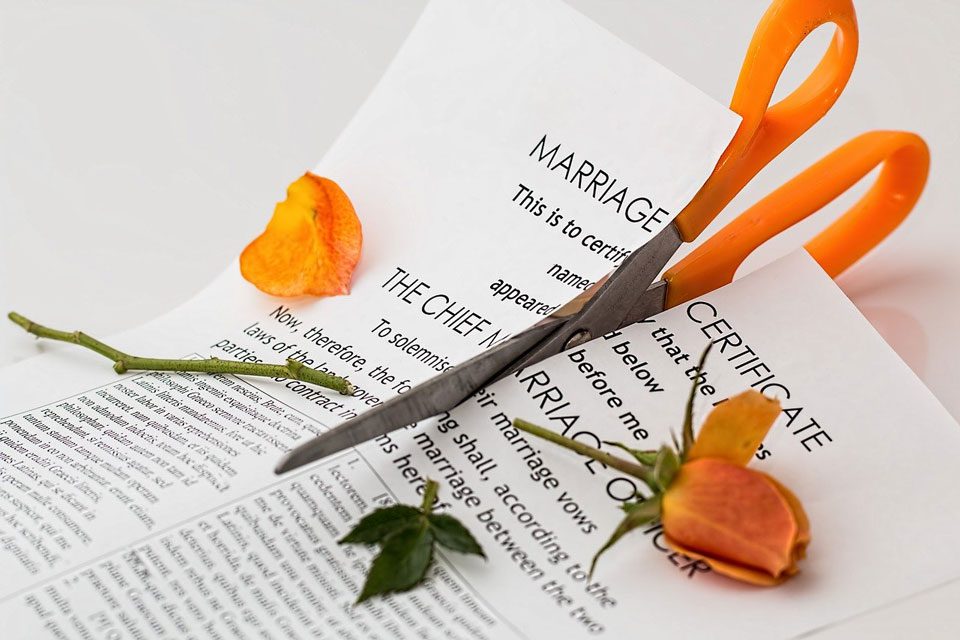Divorce
Divorce can be extremely stressful, in fact from the results of research to find out the most stressful life experiences we can go through, divorce and marital separation rank 2nd and 3rd respectively on the Holmes And Rahe Stress Scale. Sadly, the statistics are just as unpleasant, for example: 42% of marriages in England and Wales end in divorce. The Money Advice Service has calculated the average cost of divorce in the UK at £14,561 (and this doesn’t include property and child maintenance costs). It’s not a quick process either, an article in the Financial Times states that it takes at least 4-6 months to conclude a divorce or longer if a financial settlement is required. Yet despite the toll it takes on emotional health, the length of the process, and the costs involved, many people conclude that divorce is the better option than remaining in the marriage, which only highlights how bad things must have become.
For some, the impact of divorce may not be fully realised until it happens. For example, losing someone to come home to, the painful realisation that your social life and friendships may change as different friends make choices as to their allegiances to either person, the amount of time you spend with your children may reduce (especially if the parent with custody moves away), you may have to move house, have less money and may even have difficulties in your job if you had a shared business venture.
Because of all of this, it is highly likely that divorcees may experience emotions that people often have in a time of great change. The Kubler-Ross Change Curve outlines these as: denial, anger, bargaining, depression and acceptance. Denial may be experienced if the breakdown of the relationship has come as a shock or may be a subconscious response that is attempting to protect you from the harsh reality of the situation. Anger can easily occur as you reel from the hurt caused by the other spouse, or even anger at yourself for mistakes made. Bargaining (or negotiating) can occur in this process, such as ‘if we do this or that then maybe we can stay together’, or where you wrestle with whether you’ve made the right decision. Depression can then occur when the full reality of the inevitability of the divorce is realised and the sadness of it all sinks in. Acceptance is the time when you start to climb out of the depression and can see hope for your future beyond the divorce. These stages are not usually a neat linear process – you can move back and forth through them like an emotional rollercoaster.
Even if you’re the one to instigate the divorce and have many valid reasons for it, the inevitable changes it brings can result in a torrent of other painful emotions. Such as guilt, shame, regret, shock, loss of hope, feelings of failure, inadequacy, insecurity and a sense of isolation.

If you’re about to, or going through a divorce at the moment then it’s worth me mentioning at this point that it’s important that you make the most of your network of family and friends at this time – those that you feel comfortable talking about your feelings with, who can empathise and offer their support. If you don’t have anyone you feel able to talk to openly and honestly then speaking to a counsellor will be very helpful. Also, be careful not to make important decisions when you are feeling upset – it is always better to wait until you’re in a calmer frame of mind and can think more clearly to grapple with the advantages and disadvantages of the decisions you’re having to make and whether it’s the wisest course of action.
Some other insights I can share from my experience as a counsellor is that firstly, it’s important that you understand that you don’t have (and never will) the power to change your spouse. No-one (and that includes counsellors, psychologists etc.) has the power to change another person, because in order for personal change to occur, the person has to recognise that it’s needed and then have the courage and motivation to change, and then take the necessary actions to change. Yes, they may need some assistance with this, but ultimately the hard work lies with them, no-one else. You may have entered into the marriage aware of the other person’s character traits and issues, but thought that marriage, children etc. would heal them, and you may feel that because they haven’t changed, that it’s somehow your fault. However, I would encourage you to use this experience to learn that this isn’t the case, each person is individually responsible for their behaviour, and if they have long-held issues from past experiences causing behavioural problems in the relationship, then it is their responsibility to recognise this and seek appropriate professional support to find a way to heal from these.
Secondly, you may find that some of the issues in the relationship have been very painful because they have touched on tender spots in your life experience. If you feel your partner has let you down, betrayed you, been unfair in their expectations, not expressed love towards you etc. then the hurt you feel may be very deep as it’s opened up old wounds. Or you may recognise that you have over- reacted to certain problems because it’s touched on old wounds that haven’t been given the time and attention to heal. If this is the case, then I would encourage you to seek some therapy to help this pain to be tended to.
Thirdly, divorce also can take a heavy toll on your self-esteem, so here’s an apt quote from Brené Brown, an American Social Work Researcher and Professor, from her book ‘Rising Strong’:
‘Many of my research participants who had gone through a painful break-up or divorce, been betrayed by a partner…spoke about responding to their pain with a story about being unlovable – a narrative questioning if they were worthy of being loved. This may be the most dangerous conspiracy theory of all. If there’s one thing I’ve learned over the past thirteen years, it’s this: just because someone isn’t willing or able to love us, it doesn’t mean that we are unlovable.’
Finally, it’s important to take stock at the end of a relationship – to gain greater understanding of the problems that have arisen in the marriage and to build on your self-understanding, of who you are – your beliefs, morals, values, life-goals etc. and therefore the type of person you’re really looking for who can be an appropriate partner on this journey through life. Another question worth considering is ‘do you believe you are the person your ideal partner is looking for?’
If you’re heading towards, or going through divorce, and would like some help to navigate this difficult time in your life, then please feel free to contact me about counselling. It would be a privilege to have the opportunity to support you.
